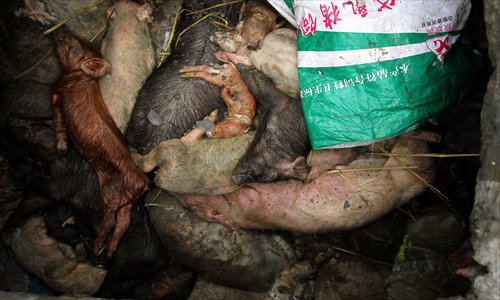Huangpu dumped pig toll nears 6,000

The number of dead pigs fished from the upper reaches of the Huangpu River, which supplies Shanghai with some of its drinking water, has soared to almost 6,000, reported Shanghai's official microblog late Tuesday afternoon.
The Shanghai government's Sina Weibo account said 233 barges have scoured the waterway and so far recovered 5,916 dead pigs.
Shanghai's water authority increased the frequency of its water testing to every four hours at nine water plants in the affected area. Drinking water for local residents remains safe, authorities said.
Meanwhile, officials in Jiaxing, Zhejiang Province, which is home to tens of thousands of pig farmers who send millions of animals to market every year, ruled out a swine virus as the cause of the deaths.
"Nothing abnormal has been detected so far," Jiang Hao, vice director of the Jiaxing Animal Husbandry and Veterinary Bureau, said on Tuesday morning.
The Shanghai Municipal Agricultural Commission earlier said only one carcass examined tested positive for porcine circovirus, a virus non-transmittable to humans.
"We are now working closely with the Shanghai government to investigate the cause of the deaths," said Wang Dengfeng, vice director of the Jiaxing publicity department.
Local farmers say indiscriminate dumping of dead pigs by the roadside or in rivers is not unusual. "I see pig carcasses floating on the river occasionally," said a pig farmer, surnamed Xu, who lives near the river.
More than 100,000 pig farmers in Jiaxing sell about 4.5 million pigs annually, Jiang, the local veterinarian official, told news portal xinmin.com.
Jiang said there are 600 pig carcass disposal centers that provide free collection services to farmers in towns and villages under Jiaxing's jurisdiction. Unscrupulous farmers who dump dead pigs in public places can be fined up to 3,000 yuan ($483).
"Normally, I collect at least 30 to 40 dead pigs daily," said Qiu Hailin, a pig carcass collector, at a Jiaxing disposal center.
The disposal center stores the dead pigs in five pools, allowing them to decompose. "There are around 5,000 dead pigs in the pools that will be full in a month, which means we will not be able to handle anymore," Qiu said.
An official with the Department of Agriculture of Zhejiang Province was quoted by chinanews.com as saying that the natural death rate of pigs is 10 percent per herd.
Related reports:
Coming clean on pollution
Pig pollution shows urgent need to ensure water quality
'Pig Delta'
Dead pigs traced back to Zhejiang
Dead pigs threaten waterway